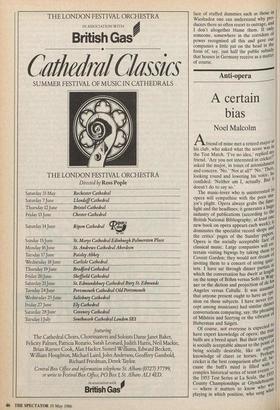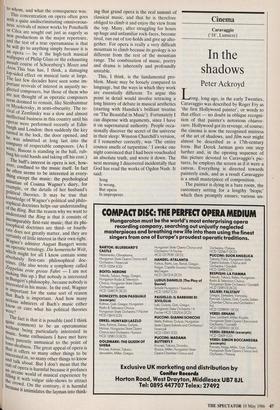Anti-opera
A certain bias
Noel Malcolm
Afriend of mine met a retired major at his club, who asked what the score was in the Test Match. 'I've no idea,' replied mY, friend. 'Are you not interested in cricket? asked the major, in tones of astonishment and concern. 'No.' Not at all?' 'No.'Thm looking round and lowering his voice, he confided: 'Neither am I, actually. But it doesn't do to say so.' , The music-lover who is uninterested in " opera will sympathise with the poor Ina jor's plight. Opera always grabs the lime" light and the headlines; it generates a huge industry of publications (according to the British National Bibliography, at least it new book on opera appears each week); lit dominates the specialist record shops anu the critics' pages of the Sunday paPers; Opera is the socially acceptable face o' classical music. Large companies will Cri- tertain visiting bigwigs by taking them t°, Covent Garden; they would not dream °1 inviting them to a concert of string guar; tets. I have sat through dinner parties au which the conversation has dwelt at lengt" on the tempi of Bohm versus Solti in Wag: ner or the diction and projection of de 107, Angeles versus Caballe. It was assuine that anyone present ought to have an °PI- nion on these subjects. I have never (ex: cept among musicians) had similar dilute' conversations comparing, say, the phrasingf of Milstein and Szeryng or the vibratos 0 Huberman and Szigeti. A to Of course, not everyone is expecte,' e have expert knowledge of opera; the tfli. se buffs are a breed apart. But their experflof is socially acceptable almost to the point it being socially desirable, like an Wens knowledge of claret or horses. Perhaje cricket is the best comparison after all, u : cause the buff's mind is filled With ° complex historical series of team events --15 the 1953 Test Series at La Scala, the 1-90"e County Championships at Glyndebour as — where it matters to know who What playing in which position, who sang W" to whom, and what the consequence was. This concentration on opera often goes with a quite undiscriminating omnivorous- ness: revivals of minor works by Ponchielli or Cilea are sought out just as eagerly as new productions in the major repertoire, and the test of a true operamaniac is that he will go to anything simply because it is an opera — be it the high-tech musical wallpaper of Philip Glass or the exhausting assault course of Schoenberg's Moses und Aron.This bias has, I think, a damaging I0P-sided effect on musical taste at large. The last few decades have seen some im- portant revivals of interest in unjustly ne- glected composers, but those of them who are not thought of as operatic composers seem doomed to remain, like Stenhammar or Myaskovsky, in semi-obscurity. The re- vival of Zemlinsky was a slow and almost ineffectual business in this country until his Operas were performed recently at Edin- burgh and London: then suddenly the key turned in the lock, the door opened, and he was admitted at long last into the Company of respectable composers. (As I nte, Busoni is standing in the hall, rub- bing his cold hands and taking off his coat.) The buff's interest in opera is not, how- ever, confined to the music itself. In fact ne often seems to be interested in every- thing except the music: the psychological minutiae of Cosima Wagner's diary, for example, or the details of her husband's Political theories. It may be true that knowledge of Wagner's political and philo- soPhical doctrines helps our understanding of the Ring. But the reason why we want to understand the Ring is that it consists of Incomparably first-rate music; that its phi- losophical doctrines are third- or fourth- rate does not greatly matter, and they are certainly of little interest in their own right. Wagner's admirer August Bungert wrote an operatic tetralogy, Die homerische Welt, Which might for all I know contain some absolutely first-rate philosophical doc- Tiles. (He also wrote a symphony called `-ePPelins erste grosse Fahrt — I am not Making this up.) But nobody is interested !tl Rungert's philosophy, because nobody is mterested in his music. In the end, Wagner Is important for the same sort of reason that Bach is important. And how many i.erous admirers of Bach's music either know or care what his political theories were?
The fact is that it is possible (and I think q...Inte common) to be an operamaniac 'about being particularly interested in billusic. Some enthusiasts I have met have ,_een patently unmusical to the point of tTine-deafness. The great appeal of opera is Fat it offers so many other things to be and in, so many other things to know end talk about. But I don't mean that the an of opera is harmful because it profanes filling arcane world of musical experience by the it with vulgar side-shows to attract bnee crowd. On the contrary, it is harmful cause it intimidates the layman into think- ing that grand opera is the real summit of classical music, and that he is therefore obliged to climb it and enjoy the view from the top. Many, after struggling for hours up huge and unfamiliar rock-faces, become tired, run out of toe-holds and give up alto- gether. For opera is really a very difficult mountain to climb because its geology is so different from the rest of the mountain range. The combination of music, poetry and drama is inherently and profoundly unstable.
This, I think, is the fundamental pro- blem. Music may be loosely compared to language, but the ways in which they work are essentially different. To argue this point in detail would involve retracing a long history of debate in musical aesthetics (starting with Hanslick's brilliant treatise on 'The Beautiful in Music'). Fortunately I can dispense with arguments, since I have it on supernatural authority. People occa- sionally discover the secret of the universe in their sleep: Winston Churchill's version, if I remember correctly, was 'The entire cosmos smells of turpentine.' I awoke one night convinced that I had been vouchsafed an absolute truth, and wrote it down. The next morning I discovered incidentally that God has read the works of Ogden Nash. It said:
Song Is wrong, But opera Is improperer.



























































 Previous page
Previous page